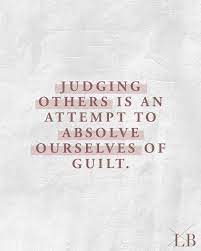 Shakirah Hunter
Shakirah Hunter
Judging others is an instinctive part of our lives as human beings, the mind finds it easy to be curious about people but it becomes too lazy to investigate the why behind any action. Therefore, the easiest response is to create judgement.
Aisha reported: The Messenger of Allah, peace and blessings be upon him, said, “Do you know who are the foremost to the shade of Allah Almighty on the Day of Resurrection?” They said, “Allah and his Messenger knows best.” The Prophet said, “They are those who accept the truth when they receive it, who offer the truth when they are asked for it, and who judge people the way they judge themselves.”
Source: Musnad Aḥmad 23858
Grade: Hasan (fair) according to Al-Suyuti
عَنْ عَائِشَةَ عَنْ رَسُولِ اللَّهِ صَلَّى اللَّهُ عَلَيْهِ وَسَلَّمَ أَنَّهُ قَالَ أَتَدْرُونَ مَنْ السَّابِقُونَ إِلَى ظِلِّ اللَّهِ عَزَّ وَجَلَّ يَوْمَ الْقِيَامَةِ قَالُوا اللَّهُ وَرَسُولُهُ أَعْلَمُ قَالَ الَّذِينَ إِذَا أُعْطُوا الْحَقَّ قَبِلُوهُ وَإِذَا سُئِلُوهُ بَذَلُوهُ وَحَكَمُوا لِلنَّاسِ كَحُكْمِهِمْ لِأَنْفُسِهِمْ
23858 مسند أحمد باقي مسند الأنصار
Whether it is WhatsApp groups, or in social settings we find ourselves naturally predisposed to judgement. Often, we find that people around us will be doing the worst of actions, yet we are not affected by it in the least and can often ignore it. Yet there are certain actions that bring about judgement immediately. The question is why is it that certain actions will always trigger us to judgement – what is it that only allows certain points of actions to trigger a rection within us. The Holy Prophet (S) has very aptly described us as mirrors and this hadith has been incorporated into modern day psychology to explain the reason behind our judgement of others.
As per Swiss psychiatrist Carl Jung, “Although our conscious minds are avoiding our own flaws, they still want to deal with them on a deeper level, so we magnify those flaws in others.”
We can only see in others what we have inside ourselves. First, we reject, then we project.
When we judge someone for something, we are actually judging ourselves as the very same thing; we just haven’t fully owned or accepted that trait yet within us.
When we judge, does it reflect others or ourselves?
“When you judge others, you do not define them, you define yourself.” ~ Earl Nightingale
As parents we find ourselves judging the parenting skills of other parents, we jump to conclusions on the choices made in the moment of parenting. We judge other children over our own kids and tend to be more lenient in judgement to ourselves over others.
As teachers we judge other teachers – we often think that their methodologies are incorrect, or we tend to compare them to the bar that we set for ourselves.
The list goes on – judgement is the lazy way out. An easy way to never have to take the time to find out the why of another person’s decision or choice. It is simply to move us away from focusing on our own areas that are in need of work or to deal with self-awareness. It is the oldest sin, and it is a direct mirror of the statement of Shaitaan wherein he stated, “I am better”.
The practice of ‘I’itizaar’ is to practice the act of looking for ‘every possible excuse for a fellow believer” – There are some narrations that we should look for 70 excuses before creating judgements irrespective of the external circumstance.
As we judge others , the question that comes to mind must constantly be : “What is this telling me about my own development?” Whether a simple judgement or a harsh judgement – my own development and self- awareness should always be center stage.







0 Comments